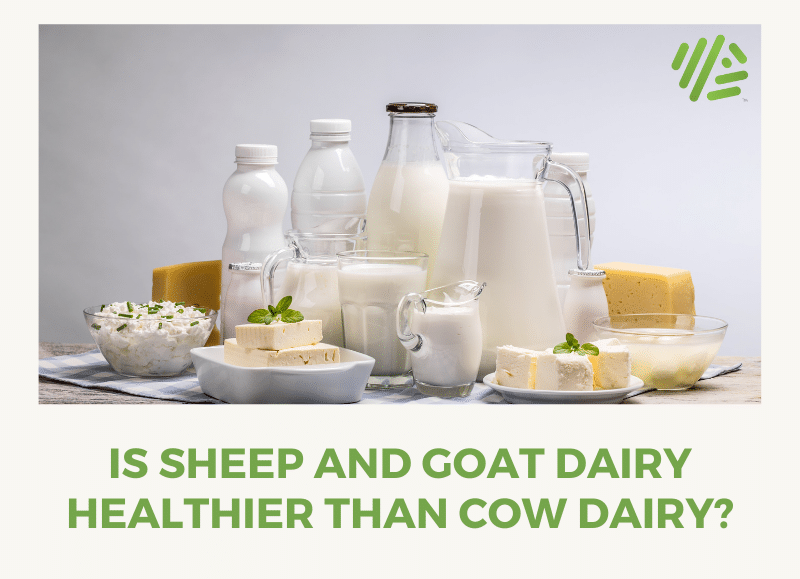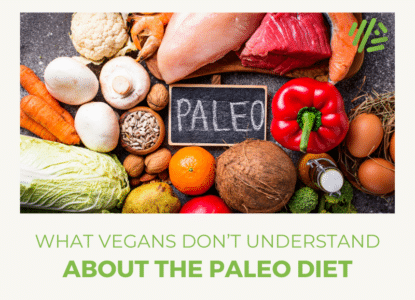Cow Casein vs. Goat and Sheep Dairy: Which is Healthier?
Article at a Glance
- Cow dairy contains different milk proteins than does goat and sheep dairy.
- Cow dairy generally contains far more A1 casein, which is harder for many people to digest.

Contents
At Gene Food, we think a lot about how to help customers identify true food intolerances, and dairy is a big one.
Sheep and goat milk are generally thought to be better for our health than cow’s milk — but why? Although they contain casein, a protein found in all dairy, sheep and goat dairy contain far less A1 beta-casein, the most inflammatory casein found in milk, and far more A2 beta-casein, the easier-to-digest form of casein.
What is casein?
- Casein is one type of protein found in dairy which is responsible for giving milk its white color.
- Different types of dairy have different types of casein, and other proteins like whey, in varying amounts.
- Each type of protein found in dairy affects our digestion differently (although some people are sensitive to all of it).
- Cow’s milk, the most commonly consumed milk in America, comprises 3.3% protein, of which more than 80% of the protein is casein while the rest is whey. Nutritionally, whey is thought to be a better protein source than casein because of its superior amino acid profile — an important factor in determining food protein quality — and it is more easily digested and absorbed. Whey is what is recommended for infant milk formula and is often found in nutritional supplements.
Casein strains the digestive system
- In sharp contrast to its easily absorbed cousin whey, casein breaks down slowly, putting a strain on the digestive system, and according to some studies, promoting cancer growth. 1
- The China Study concludes that eating animal products increases the risk of many diseases. The protein the studies used to evaluate their claims was casein.
- Colin Campbell, author of The China Study, claims milk proteins may be linked to as many as 70% of the cases of colorectal and prostate cancer; 50% of breast, endometrial, pancreatic, and gallbladder cancers; and 20% of lung, bladder, mouth, and esophageal cancers. 2 3
- Well known functional doctor, Dr. Mark Hyman wrote this blog post: 6 reasons you should avoid dairy at all costs.
- There are several types of caseins in the milk of farm animals, α-s1, α-s2 , ß, and κ, each with their own properties and purpose. 4
- The variations in casein percentages among animals can be drastic — casein makes up 80% of the total protein in cow’s milk versus only 55% of total protein in horse milk, for example — and the levels of the types of casein can even vary depending on the breed producing the milk. 5
A1 and A2 beta-casein variants
| Casein protein | What it does |
|---|---|
| A1 beta-casein | Releases beta-casomorphin-7 during digestion, which has been linked to type 1 diabetes, heart disease, infant death, autism and digestive problems |
| A2 beta-casein | Different from A1 beta-casein by one amino acid and generally thought to be safe; most commonly found in cows in Africa and Asia |
A1 beta-casein seems to be the worst
- A1 beta-casein is the only casein that creates beta-casomorphin-7, a naturally occurring opioid peptide and direct histamine releaser that can be a risk factor for some health conditions. 7
- When breeds of cattle in a particular region don’t change for over 50 years, heart disease mortality rates have correlated with the consumption of A1 beta-casein. 8
- In another study, infants fed with formula containing cow milk during the first three months of their life showed a delay in psychomotor development and heightened muscle tone.
- Breastfeeding over artificial feeding (with A1 beta-casein cow’s milk) may reduce the risk of delayed development and related disorders, like autism. 9 Digestion of A1 beta-casein, at the least, can lead to some adverse gastrointestinal effects that resemble lactose intolerance.
- In one double-blind study, 45 subjects drank milk with both variants of casein, along with milk that only contained A2 beta-casein. 10
Compared with milk containing only A2 β-casein, the consumption of milk containing both β-casein types was associated with significantly greater PD3 [post-dairy digestive discomfort] symptoms.
It can be hard to get away from casein. How do you know if the cow’s milk you’re consuming has A1 beta-casein? Milk from cows with the A1A1 genotype of beta-casein represents the main source of beta-casomorphin-7 (the bad stuff).
Be sure to also check your nutrition labels: Casein may be lurking in your protein supplements and non-dairy food, as it is used as a whitener or thickening agent. Knowing how and where the cow was raised is a start, but is not practical for most of us. The most effective way to avoid A1 beta-casein is to consume other types of milk.
More to consider
Cow, sheep, and goat milk all have the same ratio of casein to whey protein (80:20). Sheep milk is actually highest in casein and whey, in addition to fat and total solids. 11 Why? It’s all about genetics. Goat milk and sheep milk have similar amino acid sequences, both of which are different from cow’s. And the biggest difference between sheep and goat milk is the higher proportions of low-chain fatty acids; lactose is also slightly higher in goat milk than sheep milk.
The fatty acids in goat milk, however, make it easier to digest over both cow and sheep dairy. It takes about 20% less time to digest goat’s milk over cow’s milk because of the size of its fat globules. 12
Like cows, composition of goat’s milk varies between breeds and regions, but because of the lack of or much lower amount of A1 beta-caseins — along with another inflammatory casein type, alpha(s1)-casein — goat and sheep milk may be good alternatives for children who are allergic to cow’s milk or adults avoiding it for health reasons. 13 14
Goat milk also has higher levels of essential amino acids than cow milk and can help manage high cholesterol. 15 However, if you’re sensitive to cow’s milk, switching to sheep or goat’s milk may not solve everyone’s allergy problems. 16 There is a high risk of cross-reactivity with cow’s milk, so children and adults should explore goat’s milk with caution. Most children who are allergic to cow’s milk are sensitive to whey protein or casein and may therefore also be allergic to goat’s and sheep’s milk. 17
What’s in our milk?
| Cow (whole milk) | Goat | Sheep | |
|---|---|---|---|
| Carbohydrates | 11.3g | 10.86g | 13.13g |
| Fat | 7.93g | 10.10g | 17.15g |
| Protein | 7.86g | 8.69g | 14.65g |
| Vitamin D | 98 IU | 29 IU | not determined |
| Calcium | 276mg | 327mg | 473mg |
| Lactose | 12.83g | not determined | not determined |
| Cholesterol | 24mg | 27mg | 66mg |
| Fatty acids, total saturated | 4.551g | 6.507g | 11.277g |
| Histidine | 0.183g | 0.217g | 0.409g |




The decision was made for me by the gods…. i.e. I have a strong sensitivity to casein; cow milk tears me a new one, goat milk, still bothers me, but not quite as much. I can use sheep milk products with No issue; cheese, milk, yogurt, etc… all good with sheep milk. I know the physics of the issue; amino acid blocks with cow and goat milk. Just so glad I finally tried sheep milk products. I am Keto also, so very nice to hit the Manchego.
Doing research on the difference between animal milks I came across this article. Since birth, I have had an issue with dairy. This issue was digesting and also eczema (along with other symptoms). I grew up drinking cow dairy, eating cow cheese and meat. It wasn’t until my late 20s that I did a food elimination diet (with help of ND) to determine if I had food sensitivities. Turns out, yes…it was lumped into dairy. I went in and out of eating dairy (cow) but finally walked away from cow (dairy and meat). When I am exposed to cow (dairy mainly) I get what I call “hangover” symptoms. A few years back I did a food sensitivity blood test, it came back again that dairy was for sure an issue. Someone I had met suggested I read the Blood Type diet. My blood type (O-) doesn’t do well with dairy, in particular, cow. I have tried goat and sheep, found I can tolerate sheep more than goat (butter and milk is a no go. Some cheese is okay). The sheep yogurt you featured is one I buy. I love it. I get the plain or the vanilla. I have been trying to figure out what it is that I have problems with. I figured it wasn’t a lactose issue, it had to be something else. From what I read in the Blood Type Diet and also learning about Enterotypes, I think it comes down to our unique biological design (our genes). I am very grateful for your post on the topic of dairy as it will help me to explore this more. I also am hoping to dive deeper into Nutrigenetics and personalized nutrition.
Thank you for this article! My daughter is intolerant to casein along with gluten. We were encouraged by a relative to try sheep cheese which she has since Christmas time. I was told that sheep cheese was easier to digest than cow cheese. My daughter has been getting progressively sicker over time. Your article reassured me that my instincts were right, this was not a good idea. Thanks so much for your careful research!
Too bad you didn’t compare the yogurts in there plain form. You cannot even buy Siggi’s plain with no added sugar or flavor. Goat yogurt plain only has 5 grams of sugar. Forget the fruited yogurt. It’s like eating a candy bar with the amount of sugar
The gyr cattle also provides a higher A2 casein content. And it taste just as good as the common milk. But the industries will almost always favour the diairy cattle breed for their productivity.
Hi Amber.
Since I realized that after consuming dairy products my mental fatigue gets worse I’ve been reading a lot about the effects of beta-casomorphin-7 and am happy I may have finally found an answer. I appreciate all the work you’ve done to spread this knowledge.
However, there’s an area in your article I am getting a bit confused upon. You’ve cited a few studies in order to show that goat milk is much much lower in A1 Beta casein, however when I read your studies they all mention something called Alpha (s1) casein instead.
My understanding is that while Alpha (s1) casein is also a significant allergen common in dairy, it is *not* the same as A1 Beta casein. Alpha s1 and s2 caseins are different proteins while A1 and A2 Beta casein are genetic variations of the same protein.
Cow’s milk seems to have multiple issues we need to educate people on. Alpha (s1) casein and A1 Beta casein appear two different problems in cow’s milk and I think it would be useful to people if you would correct that mix-up in your article.
Thanks!
-Jay
P.S. I am curious if you do know of any studies that do in fact show what types of milk have exclusively A2 Beta casein? I recently learned that human milk would fit the criteria (https://www.ncbi.nlm.nih.gov/pmc/articles/PMC5518798/) but I don’t think we’ll find that at the supermarket anytime soon!